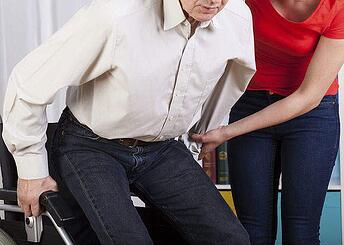 Falls are a common geriatric problem many seniors face. In an effort to prevent fall risk and the complications that can arise from fall injury, many senior care providers opt for the use of personal bed and chair sensor alarms. The question is, do they do more harm than good?
Falls are a common geriatric problem many seniors face. In an effort to prevent fall risk and the complications that can arise from fall injury, many senior care providers opt for the use of personal bed and chair sensor alarms. The question is, do they do more harm than good?
Vita Davis, Director of Nursing at Quincy Village, a Presbyterian Senior Living Continuing Care Retirement Community in Waynesboro PA says, “Alarms may provide a false sense of security to staff and families.”
So what does Davis mean when she says “false sense of security”? Personal bed and chair alarms were implemented in an effort to reduce the need for physical restraints while still offering a sense of safety and security. However, according to Davis, residents report still feeling confined and restricted by the use of alarms. Many dread moving or shifting body position for fear of “the alarm going off.” In addition, being immobilized for a long period time can result in major health complications such as skin breakdown and decreased muscle tonicity.
To effectively protect the safety of patients, Quincy Village and other communities within the Presbyterian Senior Living network are committed to providing the highest level of care. This includes changing the mindset of culture. A change of this sort begins with awareness, listening to patients, and taking the steps necessary to actualize the change.
There is no real evidence supporting the use of alarms to prevent falls. In most cases, falls continue to occur. The discontinuation of personal bed and chair alarms is part of this culture change movement. So what can be done to prevent falls and injury in seniors? Vita Davis encourages her staff to:
- Assess the risk for falls for every person on admission and periodically, thereafter, with condition changes.
- Review medications as possible cause, along with underlying medical conditions.
- Get people moving. If you don’t use it, you lose it! As we age, our muscles weaken, skin breakdown occurs, and balance is compromised.
- Know the individual’s prior lifestyle, customary routine, and preferences. It can help in developing individualized healthcare plans.
- Track the person’s toileting habits and sleep wake cycles.
- Anticipate the needs of the individual.
Long-term care nursing staff work with the frailest of the frail. In geriatrics, the fact is some will fall and even get injured. There is no way to prevent all falls. Davis says, “We concentrate, instead, on reducing the risk of injury should a fall occur.”
Learn How Culture Change is Making a Difference in Patient-Centered Care for all Presbyterian Senior Living Communities.
Click or Call 1-800-382-1385
